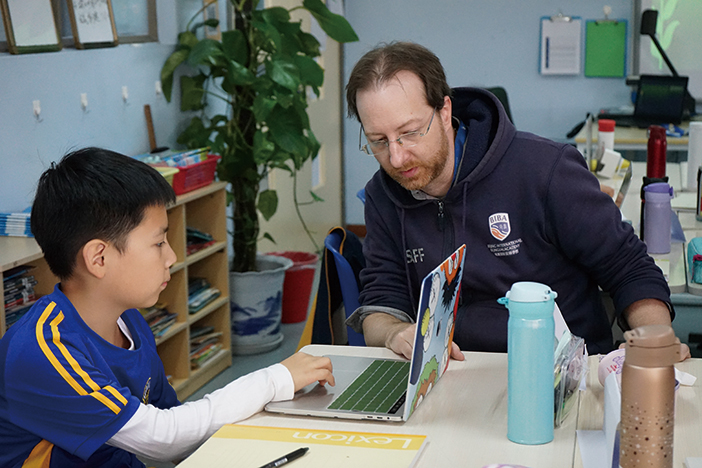Homework is one of those topics you shouldn’t bring up at a dinner party. People either think it’s the worst invention ever or absolutely necessary to make the most of your child’s education, and thus their entire lives. Now that e-learning has blurred the lines between school and home, how can parents approach homework in a way that makes it worth the time? Should parents discuss their qualms with a teacher who can then stop expecting it? Is homework really integral to the success of a child’s education?
We spoke with two educators, Jane Martuneac Kang, primary coordinator at Yew Chung International School of Beijing (YCIS Beijing), and Patrick Delaney, grade 4 teacher at Beijing International Bilingual Academy (BIBA), about their philosophies behind homework and what on earth parents can do to get their kids to love it — or be okay to drop it.

Patrick Delaney
What’s the Point?
Both Kang and Delaney agree that homework can be useful as a “retrieval practice,” which Kang describes as reinforcing “concepts taught at school, allowing the student a chance to engage with the work in a more independent format, trying to recall or use information you have previously learned. Homework is one such example of retrieval practice, a very key learning strategy.”
Delaney agrees but cautions that “homework should not be ‘busy work,’ and homework should not be a burden for students. That being said, if a student is unable to finish classwork, it can be given as homework. If the homework is not related to the class lessons, it should be avoided.”
One unexpected perk of the e-learning process last year is that parents gained insight into how children were being taught, and furthermore, how their individual child may learn best. Kang agrees that this is one way that homework can be valuable, as it “allows parents further insight into what their child is learning at school and can offer a means for parents to initiate related conversations or activities with their child in order to help deepen their understanding of the concepts in the homework.”
How to Start?
If your child is in primary school, and just moving into the homework zone, it might feel overwhelming to introduce the idea of homework into your household. After school is often the time for kids to unwind, play outside when the weather is good enough, and let their brains rest. Kang reasons that if you follow the retrieval practice theory, homework “is best done after some time has passed between learning a concept and needing to recall or use it again…. After school, allow your child a chance for a break before starting homework. Then, ensure they have all the materials that they would need to complete their homework as well as a space free from distractions. This could be a desk in one of the rooms or even the dining room table.”
Both Kang and Delaney stress that routines are key to setting expectations for homework time and teaching children to manage themselves. In his home life, Delaney goes so far as to set a reading timer, so “at 7pm every day, the whole family sits down to read together. This happens every day with very few exceptions. This is also something that cannot be forgotten because of the daily alarm that sounds around the house,” he recounts. Knowing how many distractions and interruptions home life involves, this could be an excellent solution for households struggling with consistency.
How Much Time?
Here we find another hot topic in the homework category and one that can very quickly fan the flames in a parent group on social media: how much time should be spent on homework at different ages? Differences in opinion vary greatly in any environment, and in international schools, they can be amplified.
Kang’s research-based approach strikes a clear tone of balance: “What the ‘right’ amount of time is that should be spent on homework is typically quite a debated issue, and indeed it is quite a personal choice for many families as it does impact home life. The current research does not indicate any clear or great correlation between homework and improved performance at school. Rather, there is clear research on how having too much homework could negatively affect a child, in more ways than just their academics.”
Most experts, and certainly our two local Beijing ones, agree that the age of children should determine how much time is spent on homework each day, and it should never interfere with their playtime and free time. Younger primary grades tend to focus on family reading time, and aside from that, Delaney believes that “no more than 30 minutes should be given for elementary students among all of their classes together, and the homework should be of engaging and fun quality. Homework for middle and high school students should be more rigorous, as it can often serve a different purpose. Often times the amount of learning in class is insufficient for the more complex content students in the higher grades are learning, so extra time should be allotted to completing homework. An hour of homework should not be considered excessive for middle and high schoolers, with that amount increasing as students come closer to graduating high school.”
How to Enforce?
One thing that most parents can easily agree upon is that sometimes homework is a fight. Whether it has been exacerbated by the months of e-learning or has always been this way, there are times when even the most dedicated student says no to their parents. In the older grades, that becomes a consequence the student deals with themselves the next day in class or when they are tested on the material, but how should primary grade parents handle these confrontations?
Kang suggests that “Ultimately, homework should never become a point of continual frustration nor should it occupy so much after-school time that a child has limited time for other very valuable activities. We encourage our families to liaise with our teachers to find ways to mitigate any issues that may be causing this to happen. Beyond homework, our true hope is that families will take more time at home to engage in reading together (in all the languages that the child is acquiring, including his or her mother tongue), practicing key life skills such as cooking and cleaning, and developing in areas of personal passions such as music, film, sport, etc…. Finally, and arguably most importantly, homework is a conduit for students to develop those all-important life-skills of problem-solving, time-management, organization, and responsibility.”
No matter your own opinion on the usefulness of homework, all parents must determine for themselves and their children if they see the value in it. It’s hard to make blanket statements on homework as a whole, and our experts make excellent points on “busywork” versus valuable retention and life skills-building assignments. Ultimately, it comes down to what works for your child and within your family structure. As long as these thought processes are communicated both with and to your children and their teachers, homework doesn’t have to be a four-letter word.

Jane Martuneac Kang
Tips to Encourage Your Children to Do Homework
Patrick Delaney
· Students who are not intrinsically motivated to do their homework for their own good often respond to rewards for doing homework.
· Every child is different, so pick a reward tailored for your child.
· If your child enjoys watching TV or playing video or computer games, offer them a set “reward time” that they can use to watch TV, play their game, or partake in whatever other enjoyable activity after they complete their homework.
· Pick small rewards for them to work towards each day or week rather than a big trip at the end of the year that takes more than a week to earn.
Jane Martuneac Kang
· It’s best to create and stick to routines at home, including a set homework time, so that children see it as a normal part of home life.
· If a routine isn’t working, spend time reevaluating the routine to pinpoint why it isn’t working. Has there not been enough of a break between school and homework time? Is homework conflicting with a specific interest that your child has? Work together with your child to establish a routine that could work for you both.
· Once that routine is set, stick with it.
· Spend at least the first few minutes of your child’s homework engaging with them. Ensure they understand it and model how you would do it.
· Then, stay nearby as you do your own work or read a book.
· As they are working, give small breaks as needed.
· Refrain from arguments about whether or not they will do their homework during the agreed upon time.
· Keep discussions simple by presenting them with the opportunity to make the right choice, such as “When you finish, we can…” or “As soon as you have finished, we will…”.
· Do not enter into an argument as it will not achieve the desired result.
Above all, be positive and encourage your child every step of the way, even when there are setbacks. It will take a long time to see true change, but it will happen. Praise your child’s efforts often!
Images: BIBA, YCIS, Pexels
 This article appeared in the jingkids 2021 January issue
This article appeared in the jingkids 2021 January issue




